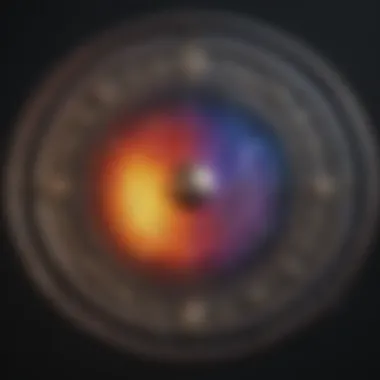Exploring the Match Test for Couples: An Astrological Perspective


Intro
Understanding relationships has always intrigued humankind. Among various methods for assessing compatibility, astrology serves as a compelling framework. It provides a unique lens through which couples can discern their strengths and weaknesses. The upcoming sections will unveil the essence of astrological concepts, explore zodiac signs in depth, and analyze the effects of celestial events.
Astrological Concepts
Astrology is not merely a system of divination; it encapsulates various theories and understandings about human nature and cosmic influences. To grasp how the match test operates for couples, one must first comprehend the fundamental astrological concepts.
Definition of Key Terms
In astrology, key terms form the backbone of analyses. Here are some important concepts:
- Zodiac Signs: The twelve divisions of the celestial sphere, each associated with particular traits.
- Elements: Fire, Earth, Air, and Water are the building blocks of zodiac traits.
- Houses: Twelve segments in an astrological chart that reflect different areas of life, from relationships to career.
Historical Background of Astrology
Astrology boasts a rich history that traverses various cultures. Originating in Babylon around the second millennium BCE, it developed through Greek, Roman, and Arabic influences. The integration of astrology into medicine, agriculture, and governance highlights its significance throughout ages.
Overview of Different Astrology Branches
Astrology is diverse, with branches tailored to various approaches and philosophies. Some major branches include:
- Natal Astrology: Focuses on individual birth charts.
- Mundane Astrology: Examines world events and trends.
- Horary Astrology: Answers specific questions based on a set time.
Each branch offers unique insights, which can contribute to understanding compatibilities in relationships.
Zodiac Signs Exploration
The zodiac is perhaps the most recognized aspect of astrology. Understanding the nuances of each sign allows couples to navigate their personalities better.
In-Depth Analysis of Each Sign
Every zodiac sign emerges from specific elemental influences, which shape its characteristics. Here is a brief look:
- Aries: Assertive and energetic.
- Taurus: Stable and grounded.
- Gemini: Adaptable and communicative.
- Cancer: Intuitive and nurturing.
- Leo: Charismatic and confident.
- Virgo: Analytical and meticulous.
- Libra: Harmonious and diplomatic.
- Scorpio: Passionate and mysterious.
- Sagittarius: Optimistic and adventurous.
- Capricorn: Disciplined and ambitious.
- Aquarius: Innovative and independent.
- Pisces: Empathetic and artistic.
Personality Traits and Characteristics
Recognizing the distinct traits of each sign can shed light on interpersonal dynamics. For instance, Fire signs may display more impulsive behaviors, while Earth signs often prefer stability. Cohesively, these traits contribute to overall compatibility.
Historical and Mythological Connections
Every zodiac sign is steeped in history and mythology. Aries, represented by the ram, connects to the tale of the Golden Fleece. This rich narrative context can deepen one's appreciation in understanding astrological compatibility.
Celestial Events
Celestial events, such as eclipses or planetary alignments, hold significant astrological value. They can affect individual energies and relationships.
Major Cosmic Phenomena
Key celestial events include:
- Lunar Eclipses: Often signal endings and new beginnings.
- Solar Eclipses: Bring transformations.
- Retrogrades: Mercury retrograde, for instance, is infamous for communication mishaps.
Impact of Celestial Events on Astrology
Astrologers assert that celestial events can amplify or mitigate energies present in relationships. Understanding these phenomena can help couples navigate challenges more effectively.
Rituals and Practices During Celestial Events


Engaging in rituals during cosmic events is a common practice among astrology enthusiasts. Common rituals include meditations, journaling intentions, and performing energy work to align with cosmic energies.
The interplay between astrological elements, signs, and celestial events enriches the understanding of relationships.
With this foundational understanding, individuals can now explore how astrology influences their relationships more deeply, guiding them in their journey of love and companionship.
Prelude to the Match Test
Understanding compatibility in relationships has always intrigued many. The Match Test serves as a tool to explore this compatibility through astrological insights. This section lays the groundwork for comprehending how astrological elements intertwine with relationship dynamics. By delving into the fundamentals of the Match Test, readers can appreciate its relevance and application in fostering healthier partnerships.
Understanding Compatibility
Compatibility between partners is often more than just shared interests or life goals. In the astrological context, it involves a complex interplay of zodiac signs, elemental influences, and personal characteristics. Different signs exhibit varied traits, and understanding these can illuminate potential areas of harmony or conflict in a relationship. Astrologers analyze how planetary positions at birth impact individual behaviors and temperaments.
This compatibility is not fixed but rather a spectrum that can evolve over time. The goal is to facilitate awareness of personal dynamics, which may enhance communication and connection between partners. Thus, recognizing astrological compatibilities serves to empower individuals to make informed decisions in relationships.
Purpose of the Match Test for Couples
The Match Test for couples is not just a superficial exercise, but a meaningful analysis aimed at improving relationships. This tool assists partners in understanding each other's strengths and weaknesses, providing a glimpse into underlying motivations and emotional needs. A primary purpose of the Match Test is to foster empathy and support, allowing couples to navigate challenges with greater ease.
The test often highlights synergies between signs and elements, leading to improved communication strategies and conflict resolution methods. As couples engage with this astrological exploration, they accumulate insights that can ultimately lead to deeper emotional bonds. By unveiling layers of compatibility, the Match Test serves as a valuable reference point for couples to not only reflect on their connections but to actively nurture them as well.
“Understanding the celestial influences on relationships can guide couples in shaping their journey together.”
Astrology and Relationships
Astrology offers unique insights into the dynamics of romantic relationships. Through examining the positions and interactions of celestial bodies, individuals can gain a greater understanding of their compatibility with partners. The significance of astrology in relationships extends beyond mere entertainment, allowing for thoughtful reflection on how various traits and temperaments interact.
The Role of Zodiac Signs
Each zodiac sign possesses distinct characteristics and behavioral patterns. Understanding these traits can empower couples to navigate their relationship more effectively. For example, Aries is known for its spontaneity, while Taurus values stability and security. Couples can identify potential conflicts or synergies based on these differences. Awareness of one’s own zodiac sign, and that of their partner can play a pivotal role in relationship dynamics.
Many believe that signs influence not just personality but also compatibility. For instance, fire signs tend to be passionate and energetic, while earth signs are grounded and practical. Knowing these elements helps someone anticipate their partner's reactions and needs.
Furthermore, like attracts like. Thus, those with similar or complementary signs might find it easier to understand each other. This understanding can foster empathy, making it essential to discuss both signs when assessing compatibility.
Elements and Their Influence
In astrology, the four elements—fire, earth, air, and water—play an essential part in shaping relationships. Each element encompasses specific energies that influence behavior.
- Fire: Represents passion and enthusiasm. Fire signs are typically dynamic and drawn to bold expressions of affection.
- Earth: Reflects stability and practicality. Earth signs often prioritize security and commitment in relationships.
- Air: Symbolizes intellect and communication. Air signs thrive on engaging conversations and mental stimulation.
- Water: Signifies emotions and intuition. Water signs are generally sensitive and need emotional connection.
Understanding the elemental composition of both partners provides clarity. For instance, a fire sign paired with a water sign can create a balance, with the fire igniting the water’s emotions. Conversely, complications can arise when two similar elements clash; two fire signs may lead to conflict due to competing strong wills.
Houses in the Natal Chart
Each house in a natal chart governs different life aspects, including relationships. The positioning of planets in specific houses reveals much about how individuals approach connection.
- First House: Represents self-identity and personal approach to relationships. Strong placements here influence a person's demeanor.
- Seventh House: The house of partnerships and marriage. This house is where the most significant insights about romantic relationships can be gleaned.
- Fifth House: Related to love affairs and creativity. The planets here indicate how one expresses affection and enjoyment in love.
Examining the planetary placements within these houses can provide valuable information. For example, a well-aspected Venus in the seventh house often indicates a harmonious partnership. Conversely, malefic presence in the fifth might suggest challenges in love affairs.
This multi-layered analysis allows for a comprehensive view of how astrological factors shape relationship compatibility. Understanding these aspects elevates one's capacity to build more meaningful connections, essential for lasting partnerships.
Components of a Match Test
The components of a match test are vital in understanding couple compatibility through astrology. These elements not only provide insight into personal relationships, but also help individuals navigate the complex dynamics that exist between partners. When analyzing compatibility, it is essential to consider various astrological techniques that capture the essence of the zodiac and its influence on relationships.
Synastry: Comparing Charts
Synastry serves as a powerful method of comparing the natal charts of two individuals. By evaluating key aspects of each chart, astrologers identify how the energies of each partner interact. This includes examining the positions of the sun, moon, and planets.


- Key Aspects to Consider:
- Conjunctions: When planets are aligned, they share energy, often indicating strong compatibility.
- Trines: Trines represent harmonious connections, encouraging mutual understanding and support.
- Squares and Oppositions: These aspects may suggest challenges that require effort to overcome.
A thorough analysis of synastry allows for a more profound understanding of relationship dynamics. Evaluating both supportive and challenging aspects can equip couples with mechanisms to improve their interactions. This in-depth examination is critical for individuals looking to deepen their connection with their partner.
Composite Charts: The Relationship's Chart
Composite charts, unlike synastry, create a unique chart that represents the relationship itself, rather than the individuals. It is constructed by averaging the positions of each partner's planets. This chart provides insights into the relationship's purpose and potential.
- Significance of Composite Charts:
- This chart highlights collective strengths and weaknesses.
- It offers a lens through which to view potential conflicts and areas for growth.
- Understanding the composite chart can inform decisions regarding major life changes, such as marriage or relocation.
Composite astrology focuses not just on who you are as individuals, but who you become together.
In summary, both synastry and composite charting are essential components of a match test. They provide an intricate understanding of relationship dynamics, serving as tools for self-awareness and growth. By utilizing these methods, couples can navigate their journey together with greater clarity and insight.
Methodologies for Assessing Compatibility
Understanding the methodologies for assessing compatibility is crucial in the realm of astrological matchmaking. Various approaches not only enhance comprehension but also provide tools for individuals seeking deeper insights into their relationships. Emphasizing compatibility helps couples navigate the complexities of their emotional and spiritual connections. By employing different methodologies, one can evaluate underlying dynamics and discover potential growth areas in relationships. This section will delve into traditional astrological techniques alongside modern approaches, offering a spectrum of insights into compatibility analysis.
Traditional Astrological Techniques
Traditional astrological techniques form the cornerstone of astrological compatibility assessment. These methods have been utilized for centuries, reflecting human beings' innate desire to understand themselves and their partners through the celestial lens. Some key elements of traditional methods include:
- Natal Charts: Each individual’s natal chart serves as a blueprint, detailing celestial positions at the time of birth. Examining the interplay between two natal charts reveals fundamental compatibility aspects.
- Synastry: This technique involves overlaying partners' natal charts to identify harmonious and challenging aspects. Planets in beneficial angles support connection, while those in harsh aspects may present obstacles.
- Composite Charts: A composite chart synthesizes both partners’ energies into a single chart, representing the relationship itself, which allows for a focused analysis of the relationship dynamics and how both individuals can interact more effectively.
These traditional techniques provide a foundational framework for compatibility assessment, offering insights into emotional, mental, and spiritual alignment.
Modern Approaches to Compatibility Testing
Modern approaches to compatibility testing introduce innovative frameworks that complement traditional methods. As society evolves, so do the needs of couples seeking relationship insights. This adaptation has led to distinct methodologies:
- Psychological Astrology: This approach combines astrological insights with psychological principles. It seeks to understand how personal traits influence relationship dynamics. By examining each partner’s psyche, one can gauge compatibility beyond mere celestial alignments.
- Relationship Surveys: Modern relationship compatibility often integrates data-driven methods. Couples can engage in surveys or assessments that measure values, interests, and relationship goals. This quantitative approach can highlight compatibility factors that traditional techniques might overlook.
- Technology and Apps: The use of mobile applications for astrological compatibility has become increasingly popular. These tools provide instant analyses of compatibility based on provided data, making it accessible for those unfamiliar with astrology.
Through integrating traditional and modern methodologies, individuals can acquire a well-rounded perspective, improving their understanding of compatibility in their relationships.
Assessing compatibility through a blend of traditional and modern methodologies enriches insights and deepens connections between partners.
Common Misconceptions in Astrology
Astrology often encounters skepticism and misunderstanding among individuals, especially those approaching the subject from a scientific perspective. This section seeks to clarify common misconceptions surrounding astrology, specifically as it relates to relationship compatibility. Understanding these misconceptions is vital because it enables individuals to engage with astrology more critically and informed.
Astrology versus Scientific Skepticism
Astrology is frequently critiqued by skeptics who view it as a pseudoscience. The main argument against astrology is that it lacks empirical support and relies heavily on anecdotal evidence. Proponents of astrology argue that it provides valuable insights about personality, compatibility, and behavior based on celestial movements. The challenge lies in balancing these two perspectives. While scientific methods hinge on reproducibility and objective data, astrology incorporates subjective experiences and interpretations.
Consider this aspect: Astrology can offer a framework for self-reflection and personal growth, even if it's not scientifically validated. People frequently find astrological insight meaningful and transformative in their relationships. Despite criticism, astrology persists as a spiritual and psychological tool across various cultures and traditions.
Skepticism has its place, but dismissing astrology without exploration can limit a person's understanding of themselves and their relationships.
Astrology is Not Destiny: Free Will
Another common misconception is the belief that astrological placements determine one’s fate completely. Many individuals think that the alignment of stars and planets destined them for specific outcomes or relationships. However, this viewpoint undermines the concept of free will. Astrological insights should be seen as tendencies or influences rather than absolute determinants.
In reality, each person has the autonomy to make choices that shape their lives and relationships. Astrology serves as a guide to understanding personality traits, potential conflicts, and compatibility. It can highlight patterns and potentials but does not dictate actions or outcomes.
“The stars do not compel; they merely illuminate possibilities.”
In exploring the dynamics of a relationship, awareness of astrological influences can lead to better communication and personal growth. Acknowledging that individuals retain the power to make choices can foster a more enriching relationship experience.


In summary, while some may view astrology as deterministic, it is helpful to consider it a resource for insight rather than a fixed path. This perspective encourages a healthier dialogue around compatibility, emphasizing that individuals play a pivotal role in shaping their own destinies.
Psychological Aspects of Compatibility
Understanding the psychological dimensions of compatibility is crucial in the astrological match test framework. This section focuses on how psychological elements, such as attachment styles and communication patterns, shape relationships. Recognizing these aspects helps in assessing not only the astrological alignment but also the underlying psychological compatibility between partners.
Attachment Styles and Relationships
Attachment styles are formed during early development and have significant implications on adult relationships. These styles influence how individuals connect with others, manage conflict, and express intimacy. The four main attachment styles are secure, anxious, avoidant, and disorganized.
- Secure Attachment: Individuals with a secure attachment style tend to be comfortable with intimacy and independence. This style fosters trust and effective communication, which are essential for healthy relationships.
- Anxious Attachment: Those with an anxious attachment often seek closeness and may fear abandonment. This can lead to emotional volatility and challenges in communication.
- Avoidant Attachment: Avoidant individuals may distance themselves emotionally. They often value independence strongly and might shy away from deeper connections, impacting relationship dynamics.
- Disorganized Attachment: This style often arises from traumatic experiences, leading to confusion regarding intimacy. Individuals may fluctuate between seeking closeness and pulling away.
Understanding these attachment styles is beneficial. Each partner's style interacts with the other’s, influencing overall compatibility. For example, a secure individual can provide stability to an anxious partner, whereas two avoidant individuals may struggle to create a profound connection.
Conflict Resolution and Communication
Communication patterns are significantly linked to how couples resolve conflicts. Effective communication might not occur without understanding each other's perspectives and needs. Here are some key considerations:
- Active Listening: Partners should practice paying attention to each other's thoughts and emotions without judgment. This fosters respect and ensures that both parties feel heard.
- Expressing Needs Clearly: Clear articulation of thoughts and feelings is vital. Ambiguity can lead to misunderstandings, increasing conflict.
- Emotional Regulation: Couples who manage their emotional responses effectively can navigate conflicts more healthily. Techniques like breathing exercises or taking breaks can mitigate heated situations.
- Seeking Solutions Together: Collaborative problem-solving promotes unity. When both partners work together to resolve issues, it strengthens the bond and enhances relationship satisfaction.
Effective conflict resolution is not about winning arguments; rather, it's about growing together.
Incorporating these psychological aspects into the match test allows couples to gain deeper insights into their relationships. By looking at attachment styles and communication practices, individuals can identify potential areas for growth, leading to a more robust, harmonious partnership.
Real-Life Applications of Match Tests
Exploring the practical uses of match tests offers valuable insights into how astrology can enhance personal relationships. The significance of these tests extends beyond mere compatibility checks; they can serve as tools for introspection, understanding, and growth between partners.
Real-life applications can illuminate relationship dynamics, providing clarity and direction. They can help identify potential sources of conflict, highlight shared strengths, and inform strategies to navigate challenges. By recognizing how astrological factors influence behaviors and emotions, couples can develop a deeper connection, leading to healthier relationships.
How to Use a Match Test for Personal Reflection
Using a match test for personal reflection involves several steps. Start by gathering the birth charts of both partners. This includes the date, time, and location of birth. You can then engage in a synastry analysis, where you compare planetary positions to assess compatibility. This exercise can help partners think critically about their relationship dynamics.
A self-evaluation can also be essential. Reflect on the following:
- What are your attachment styles?
- How do you usually resolve conflicts?
- Do certain astrological placements resonate strongly with your experiences?
These considerations can foster personal growth and promote understanding of oneself and one’s partner. The match test can thus act as a catalyst for meaningful conversations and enhance emotional intimacy.
Benefits of Astrology in Relationship Counseling
Employing astrology within relationship counseling offers unique benefits. It helps in identifying unconscious patterns that may be detrimental to the relationship. Counselors can utilize astrological insights to tailor strategies to the specific needs of each couple.
Some key benefits include:
- Enhanced Communication: Understanding astrological influences can improve conversations about feelings and needs.
- Conflict Resolution: By recognizing recurring astrological themes, couples can develop informed approaches to disagreements.
- Self-Awareness: Astrology encourages partners to explore their traits, leading to increased empathy and compassion.
Final Thoughts on Match Tests for Couples
The exploration of match tests for couples from an astrological standpoint offers profound insights into the dynamics of relationships. Understanding how various astrological elements interact can help deepen the awareness couples have about their compatibility. Astrology can serve as a lens through which individuals examine their interpersonal connections, guiding them toward healthier patterns and interactions.
The Limitations of Match Tests
Despite their potential benefits, match tests are not without limitations. While astrological compatibility can highlight areas of strength and weakness, it should not be viewed as a definitive measure of relationship success. Several factors can influence a relationship's dynamics beyond what astrology suggests. Thus, it is crucial to treat these tests as tools for reflection rather than absolute predictors of outcomes.
Some limitations to consider include the following:
- Contextual Factors: External influences such as family, cultural background, and life circumstances play a significant role in a relationship. Astrology alone cannot encompass the complexity of these factors.
- Personal Growth: Individuals evolve over time. A match test conducted in one phase of life may not accurately represent compatibility in another. Personal and emotional growth can shift dynamics significantly.
- Reductionism: Simplifying relationships to astrological signs overlooks the deeper emotional and psychological components that contribute to human connections. Each person brings a unique set of experiences and traits that cannot be calculated purely from their birth chart.
Overall, while these tests offer valuable insights, they should not replace communication and empathy in developing strong relationships.
Encouraging Healthy Relationships through Insight
Utilizing astrological insights can significantly enhance the quality of relationships. By understanding intrinsic compatibilities based on astrological elements, couples can cultivate healthier connections. Here are some ways in which astrology can encourage better relationships:
- Improved Communication: Awareness of each partner's astrological traits can foster understanding. Knowing a partner's communication style based on their zodiac sign helps in resolving conflicts more effectively.
- Conflict Resolution: Astrology can provide clues about potential areas of disagreement. Recognizing these tendencies allows couples to preemptively address issues, promoting harmony in the relationship.
- Tailored Approaches: Each zodiac sign has unique needs and desires. Understanding these can help partners support each other’s emotional and psychological requirements.







